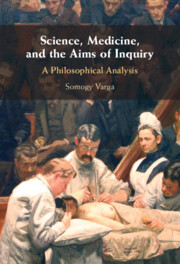Book contents
- Science, Medicine, and the Aims of Inquiry
- Science, Medicine, and the Aims of Inquiry
- Copyright page
- Contents
- Preface and Acknowledgments
- Introduction
- Chapter 1 Challenges to Medicine at the End of Its “Golden Age”
- Chapter 2 Toward a Normative Philosophy of Medicine
- Chapter 3 Science and Medicine
- Chapter 4 Inquiry in Medical Science
- Chapter 5 Understanding in Medicine
- Chapter 6 The Aim of Medicine I
- Chapter 7 The Aim of Medicine II
- Chapter 8 Rethinking the Challenges
- Conclusion
- References
- Index
Chapter 2 - Toward a Normative Philosophy of Medicine
Published online by Cambridge University Press: 16 May 2024
- Science, Medicine, and the Aims of Inquiry
- Science, Medicine, and the Aims of Inquiry
- Copyright page
- Contents
- Preface and Acknowledgments
- Introduction
- Chapter 1 Challenges to Medicine at the End of Its “Golden Age”
- Chapter 2 Toward a Normative Philosophy of Medicine
- Chapter 3 Science and Medicine
- Chapter 4 Inquiry in Medical Science
- Chapter 5 Understanding in Medicine
- Chapter 6 The Aim of Medicine I
- Chapter 7 The Aim of Medicine II
- Chapter 8 Rethinking the Challenges
- Conclusion
- References
- Index
Summary
The chapter defends a particular philosophical engagement with medicine (i.e., normative philosophy of medicine) that is directly connected to the problem of determining the nature of philosophical inquiry. It starts with the discontinuity view, notably advocated by Pellegrino (1986; 2001), suggesting philosophy and science are discrete. Two primary arguments support the discontinuity view: science is empirical while philosophy is conceptual (Dummett 2010), and science is descriptive while philosophy is normative (Thomasson 2015; 2017). The chapter critically examines and ultimately rejects these claims, introducing the continuity view as an alternative, positing a close relationship between philosophical inquiry and science. Building on the works of Sober (2008), Kaiser (2019), and Kitcher (2011), a normative philosophy of science approach is proposed, distinguishing three levels of analysis (aims, nature, and key concepts), which mirror the types of questions posed by modern medical challenges. The chapter concludes by endorsing philosophy of medicine as a legitimate subdiscipline of philosophy of science, and arguing for the comprehensive value of this approach over conventional perspectives.
- Type
- Chapter
- Information
- Science, Medicine, and the Aims of InquiryA Philosophical Analysis, pp. 38 - 56Publisher: Cambridge University PressPrint publication year: 2024

